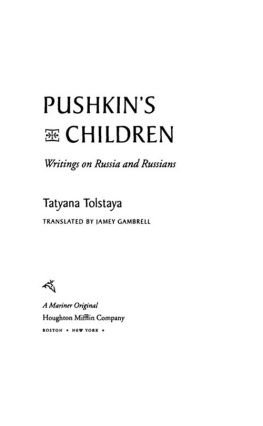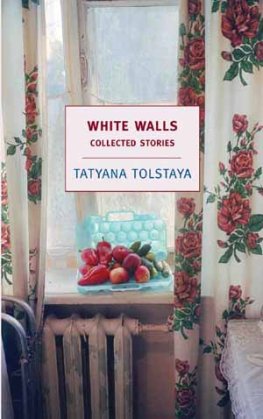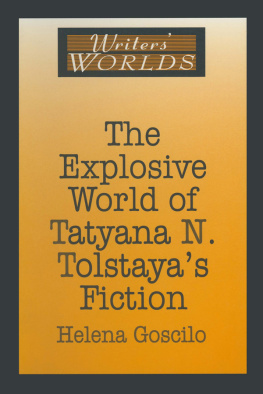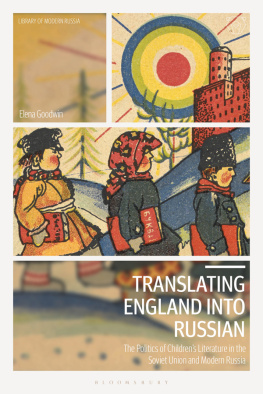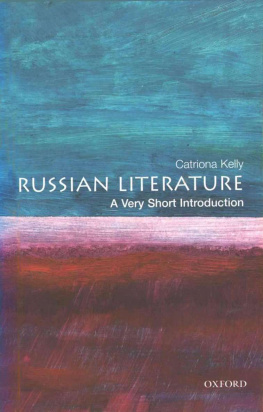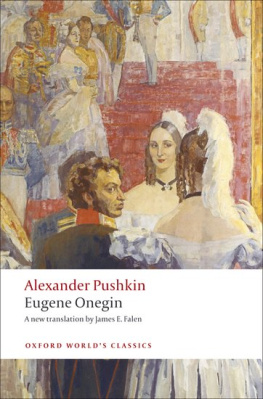Copyright 2003 by Tatyana Tolstaya
English translation copyright 1991, 1992, 1993, 1994, 1995, 1996, 1997, 1998, 2000 by Jamey Gambrell
All rights reserved
For information about permission to reproduce selections from this book, write to Permissions, Houghton Mifflin Company, 215 Park Avenue South, New York, New York 10003.
Library of Congress Cataloging-in-Publication Data is available.
ISBN 0-618-12500-0
Book design by Melissa Lotfy
Typefaces: Adobe Garamond and Baker Signet
Printed in the United States of America
QUM 10 9 8 7 6 5 4 3 2
Portions of this book previously appeared in The New York Review of Books, The New Republic, Wilton Quarterly, The New Yorker, and The New York Times Magazine.
Excerpt from The Struggle for Russia by Boris Yeltsin, copyright 1994 by Boris Yeltsin. Used by permission of Times Books, a division of Random House, Inc.
Introduction
IF THE REALLY LUCKY WRITERS are the ones who survive the hideous misadventures of history, then Tatyana Tolstaya is fortunate beyond telling. Consider the devastating events she and her countrymen have lived through in the half-century her lifetime spans: hunger, persecution, treachery and corruption, highly convoluted inducements to fear, brainwashing (and, sometimes, in the face of it, the most heroic adherence to the liberty of the mind), scarcity and demeaningnot ennoblingpoverty, decades of spiritual stagnation and disgust. And then consider the stage on which these tragedies of the Soviet Union played themselves out: Great Russia itself, the chill white motherland, endless, magnificent, all-consuming. Oh, to be born in the proximity of such material!
Even better luck, the author who claims this rich inheritance came of age as a writer sometime around the middle of the 1980s, just in time to record the death by putrefaction of Soviet socialism, the collapse of its vast empire, and the subsequent lurching advance of the post-Soviet state. These events took place beginning in 1985, with the designation of Mikhail Gorbachev as general secretary of the Communist Party of the Union of Soviet Socialist Republics. His momentous years in power were followed by the adventures in government of President Boris Yeltsin. Under the pallid leader Vladimir Putin, Russia now struggles with its past and future. Tolstaya has written about all of it and so presents the happy reader with the twenty essays in this book, a brilliant writers ongoing account of the most transcendent political event of the second half of the twentieth century.
Tolstaya has published three other books in English translation: two short works of fiction written in a delicate, richly meditative register, and her latest novel, The Slynx. As a writer of fact Tolstaya takes on a very different voice. In fact, she writes as a participant in her countrys lamentable history, and she is a spinning fury, emitting words like sparks, enraged, saved from choking on the absurdities she has been called to witness only by the irresistible need to laugh at them. Indignation is her creative fuel, and her only relief is a related mordant tenderness for the sorry protagonists of so much stupidity. She does beautifully when she has to wave farewell to the poet Joseph Brodsky, dead so long before his time. She does even better, though, when she takes on the lumbering Boris Yeltsin and slaps him around in print, calling him a great Russian dolt, upbraiding him for doing this and failing to do the other, then stops in her tracks to observe him, deathly tired of so much responsibility, as he asks his helicopter pilot to land by a river and just linger a while. And what of her description of the epic, pathetic, and maligned Russian Everyman, grimy from centuries of poverty and selfneglect, without so much as a radish to bite on before he gulps down a shot of vodka, sniffing instead at the filthy sleeve of his greatcoat in order to get, at least, a good whiff of its many spicy odors?
Tolstaya is the offspring of a deeply literary family (although, she has said, she was well into adulthood before she started writing, in response to steady and gentle pressure from her father). Lev Tolstoy is among her forebears. Her paternal grandfather, Alexei Tolstoy, was a famous writer of the Soviet era. Her father was a brilliant scholar. Her mothers father, Mikhail Lozinsky, produced definitive translations of Shakespeare, Dante, and Lope de Vega. Tolstaya was born while Joseph Stalin was still alive, but the near-sacred family name shielded its members from terror, and Tatyana grew up in relative comfort in a book-filled apartmentall of which placed her rather outside the Soviet norm and granted her precocious observer status. She learned early to tell stories and quarrel with words, and would suffer when she was not able to find the inner words to describe her feelings, she later recalled. At university she studied the classics. She worked in a publishing house. At last, she started writing. She made a short trip to the United States and then, in the company of her husband, moved there in 1989. She learned English, and when she realized she was learning too much of it she fled back to her native country, before her Russian suffered any damage. (She retains enough English, however, to work closely with Jamey Gambrell on the latter's beautiful, muscular translations.)
The authors childhood, glowing and privileged in so many ways, nevertheless coincided with the cold war's years of frozen panic, and also with the long interregnum in which the Soviet leadership relaxed in power, believing itself eternal. Growing up surrounded by the bad faith and false language of that particular stage of socialism, Tolstaya learned to take rhetoric seriously. This lucky accidentyet another!gives her enormous range, as rhetoric permeated every aspect of Soviet life. Lenins tomb was a rhetorical exercise, and so was urban design, as Tolstaya reminds us when she writes about the heirs to Field Marshal Potemkin: the scruffy bureaucrats who ordered all the houses on Richard Nixons route to the Kremlin painted and refurbished in preparation for his visit. But most of all, of course, rhetoric dominated language, and language dominated thought. The Party is our Helmsman! You are walking the true path, comrades! (rhetoric loves exclamation points) and The Party is the Mind, Honor, and Conscience of the People! (rhetoric loves capital letters, too) are among the deadly avalanche of slogans the young Tatyana's love of words survived.
The authors swift, skillful weaving between false words and the reality they hit at a slant allows her readers to become intimate with the eerie unnaturalness of Soviet existence. On the surface, the coarse fabric of everyday life could not have been more stultifying and commonplace. But because it was shot through with the glinting thread of so many wild, extravagant, preposterous lies, it acquired a dreaminess, a mythical quality, that serves Tolstaya's literary purposes well. Memorably, she tells how, as a child playing in the courtyard, she helped defeat U.S. imperialism and the omnipresent network of spies and infiltrators she had been warned against: Who knows, they might be anywhere, disguised as Soviet citizens in regular clothes. They would reveal all our mysteries, steal the secrets of our might, and, God forbid, become just as strong and unconquerable as we were. These enemy agents must be deceived at all costs. When on a spring day an aged, wheezing couple shuffles towards her to ask directions, she understands her duty and sends them tottering away in the opposite direction from the botanical gardens they wish to visit.
Early guilt can carve an entire life into a different shape. Age eight, watching the elderly couple make their painful progress in the wrong direction, she is overwhelmed by the knowledge that they are not spies. I heard the scrape and clank of the cogs in the state propaganda machine, a machine that had forgotten why it was turning, she writes. She understands something basic about how the lies her elders told her have twisted her soul. Who knows but that her nonfiction writing career has been one long effort to make things right with the two pathetic strangers she betrayed as a child?
Next page
